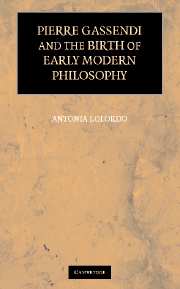Book contents
- Frontmatter
- Contents
- Preface
- References to Gassendi's Works
- Introduction
- 1 Gassendi's Life and Times
- 2 Gassendi's Philosophical Opponents
- 3 Skepticism, Perception, and the Truth of the Appearances
- 4 Cognition, Knowledge, and the Theory of Signs
- 5 Space and Time
- 6 Atoms and Causes
- 7 Bodies and Motion
- 8 Generation, Life, and the Corporeal Soul
- 9 The Metaphysics of Body
- 10 Faith, Reason, and the Immaterial Soul
- Bibliography
- Index
2 - Gassendi's Philosophical Opponents
Published online by Cambridge University Press: 24 July 2009
- Frontmatter
- Contents
- Preface
- References to Gassendi's Works
- Introduction
- 1 Gassendi's Life and Times
- 2 Gassendi's Philosophical Opponents
- 3 Skepticism, Perception, and the Truth of the Appearances
- 4 Cognition, Knowledge, and the Theory of Signs
- 5 Space and Time
- 6 Atoms and Causes
- 7 Bodies and Motion
- 8 Generation, Life, and the Corporeal Soul
- 9 The Metaphysics of Body
- 10 Faith, Reason, and the Immaterial Soul
- Bibliography
- Index
Summary
Gassendi opposes the three main intellectual systems of his day: scholastic Aristotelianism, Renaissance neo-Platonism, and the philosophy of Descartes. His critiques of Aristotelianism and neo-Platonism are among his first published works, and his Objections to the Meditations were written during the relatively early stages of composition of the Syntagma: Gassendi presented his opposition to the major philosophical schools of his day before his positive views were fully developed.
Gassendi draws both a rhetorical and a methodological distinction between clear and obscure philosophy and suggests that all three intellectual systems contain elements of obscurity that render them unacceptable (1.13b–17a). The foremost representative of the clear philosophy is, as one might expect, Epicurus. Gassendi acknowledges that there are points where Epicurus is less than clear – as in his accounts of the gods and the nature of the human soul – but it is now possible to give a revised, clear version of Epicurus' philosophy. (It is worth noting that the Epicurean accounts of the gods and the human soul are not rhetorically or methodologically particularly different from the rest of the Epicurean system, but they are strikingly different in terms of their acceptability to a Christian audience.) Other clear philosophers include Pyrrho and the Stoics. Empedocles, Parmenides, Pythagoras, Plato, Heraclitus, and Aristotle exemplify obscure philosophy. Gassendi's favorite contemporary, Bacon, is clear, and Robert Fludd, for instance, is obscure. The stated criteria for obscurity are rhetorical.
- Type
- Chapter
- Information
- Pierre Gassendi and the Birth of Early Modern Philosophy , pp. 34 - 59Publisher: Cambridge University PressPrint publication year: 2006



